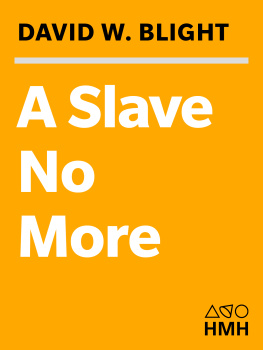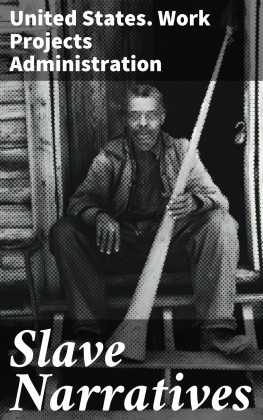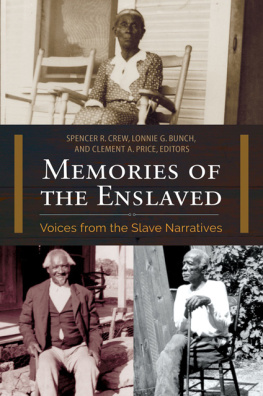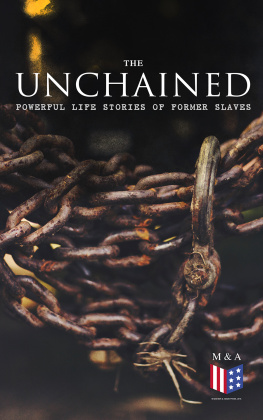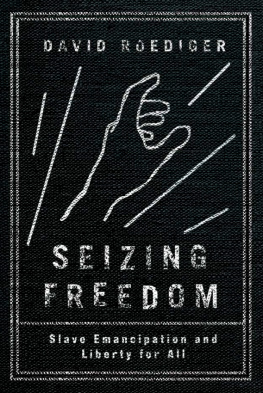First Mariner Books edition 2009
Copyright 2007 by David W. Blight
All rights reserved. No part of this publication may be reproduced or transmitted in any form or by any means, electronic or mechanical, including photocopy, recording, or any information storage and retrieval system, without permission in writing from the publisher.
For information about permission to reproduce selections from this book, write to Permissions, Houghton Mifflin Harcourt Publishing Company, 215 Park Avenue South, New York, New York 10003.
www.hmhco.com
The Library of Congress has cataloged the print edition as follows:
Blight, David W.
A slave no more: two men who escaped to freedom, including
their own narratives of emancipation/David W. Blight.1st ed.
p. cm.
Includes first-person narratives of fugitive slaves
John Washington and Wallace Turnage.
Includes bibliographical references and index.
1. Washington, John, 18381918. 2. Turnage, Wallace, 18461916.
3. Fugitive slavesUnited StatesBiography. 4. SlavesVirginia
FredericksburgBiography. 5. SlavesNorth CarolinaGreen
CountyBiography. 6. United StatesHistoryCivil War,
18611865African Americans. 7. African AmericansBiography.
8. Working classUnited StatesBiography.
9. Slave narrativesUnited States. I. Title.
E450.W325B58 2007
973.7'115dc22 2007014467
ISBN 978-0-15-101232-9
ISBN 978-0-15-603451-7 (pbk.)
e ISBN 978-0-15-603548-4
v2.0115
To the memory of Martha A. Blight
By the rivers of Babylon, there we sat down,
yea, we wept, when we remembered Zion.
We hanged our harps upon the willows
in the midst thereof.
For there they that carried us away captive
required of us a song; and they that wasted
us required of us mirth, saying, sing us one
of the songs of Zion...
O daughter of Babylon, who art to be destroyed;
happy shall he be, that rewardeth thee as thou
hast served us.
P SALM 137
Before morning I had begun to feel like I had truly
escaped from the hand of the slave master... I never
would be a slave no more.
J OHN W ASHINGTON , REMEMBERING HIS FIRST NIGHT
OF FREEDOM ALONG THE R APPAHANNOCK R IVER
I now dreaded the gun and handcuffs and pistols
no more. Nor the blowing of horns and the running
of hounds, nor the threats of death from the rebels
authority.
W ALLACE T URNAGE , REMEMBERING HIS FIRST HOURS
OF FREEDOM ON A SAND ISLAND IN M OBILE B AY
Prologue
No man can tell the intense agony which is felt by the
slave, when wavering on the point of making his escape.
All that he has is at stake; and even that which he has not
is at stake also. The life which he has may be lost, and the
liberty which he seeks, may not be gained.
F REDERICK D OUGLASS , 1855
John Washington, a twenty-four-year-old urban slave in Fredericksburg, Virginia, escaped across the Rappahannock River to Union army lines in April 1862 by ingenuity, skillful deception, and courage. Through the chaos of war he found his way to a tenuous freedom in Washington, D.C. Wallace Turnage, a seventeen-year-old slave born in North Carolina, ran away four times from an Alabama cotton plantation before he fled a Mobile slave jail on his fifth and final escape. In a harrowing and dramatic journey, he made his way on foot through swamps and snake-infested rivers to the safety of the Union navy in Mobile Bay in August 1864.
Both Washington and Turnage wrote remarkable post-emancipation narratives of their flights to freedom. Both also lived remarkable post-emancipation lives as laborers and citizens in Washington and New York City. In publishing their narratives and reconstructing their life stories for the first time, this book illuminates anew one of the greatest dramas of the Civil Warthe anguished and glorious liberation of four million American slaves from generations of bondage.
Authors often spend years planning, researching, and outlining their books. But this book found me in a rather unusual way. In the spring of 2003 I was contacted by literary agent Wendy Strothman, who was working on behalf of Julian Houstona writer and retired judge in Boston who had inherited John Washingtons writings and papers from his mother, Alice Jackson Stuart. Alice Stuart had been the best friend of Washingtons granddaughter Evelyn Easterly, who had saved and passed on her forebearers writings. Wendy knew of my work on slave narratives, which have emerged in the past three decades as the founding texts of African American literature and an essential form of documentation for American slavery. Several years ago I edited a new edition of the most famous slave narrative of all, Narrative of the Life of Frederick Douglass, an American Slave, Written by Himself. Wendy sent me a photocopy of Washingtons narrative and asked me to read it with an eye for authenticity and significance.
Months passed before I paid close attention, since I was preoccupied with other work and in the midst of a career move. In the fall of that year Debra Mecky, director of the Historical Society of the Town of Greenwich, Connecticut, invited me to give a lecture to her board of trustees. At dinner before the lecture, Debra asked me if I would be willing to have a look at what she and her staff believed to be an authentic slave narrative. It recently had been donated by Gladys Watts, a surviving friend of Wallace Turnages daughter, Lydia Turnage Connolly, who had preserved the narrative in a special black clamshell box until her death in Greenwich in 1984. My initial response was, Another one? Residents of the Town of Greenwich had owned small numbers of slaves in the late eighteenth and early nineteenth centuries. And now this wealthy small town had a former slaves dramatic story housed in their official heritage attic.
When I finally sat down and carefully read the two narratives together, I realized with a thrill of discovery that what we possessed were two extraordinary, unpublished, and probably unmediated narratives about one of the most revolutionary transitions in American history. If the lives of these two men could be verified, we would have two original ways of seeing how American slaves achieved freedom in the Civil War. Post-emancipation narratives by ex-slaves that told the story of their liberation from bondage in the 1860s are rare enough; in my lifetime a mere handful have surfaced, making these two untouched manuscripts very special.
Judge Houston had placed the Washington narrative on deposit at the Massachusetts Historical Society in Boston for professional safekeeping. Wendy Strothman arranged for me to meet Houston, and through the good services of the MHS, I saw the original manuscript of the Washington narrative and its many accompanying documents and photographs. We also went to Greenwich to see the original Turnage manuscript. Then we arranged an agreement among all the parties that I would combine the two narratives in one volume and tell the stories of Washington and Turnage together, including whatever I could uncover about their postwar lives.
In the case of Turnages narrative, the HSTG had the wisdom to engage two people to work on the document before I was involved. Candis LaPrade, a literature professor at Tulane University, read the memoir and wrote a short essay placing it within the genre of slave narratives. Most important, the HSTG hired Christine McKay, an archivist at the New York Public Librarys Schomburg Center for Research in Black Culture, to investigate Turnages life after slavery. I in turn asked Christine to help me do the same for the postslavery life of John Washington. Her dogged pursuit of the details of each mans life has been crucial to this book. With Christines help, I have traced the post-emancipation lives of both Washington and Turnage.
Their stories are both unique and representative. They are individual tales of freedom as well as two ways of seeing the whole epic of emancipation. They remind us that history is unpredictable, anguished, and hidden, but also sometimes patterned, triumphant, and visible in the quiet and turbulent corners of the lives of real people.
Next page
